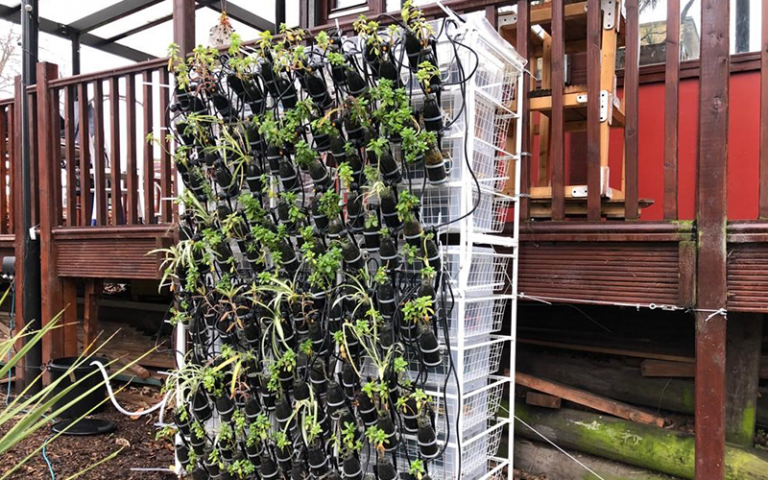Generating electricity from food waste in a London community garden
Researchers at UCL are working with the Calthorpe Community Garden in Kings Cross, London, to create a vertical garden using microbial fuel cells, to generate electricity and decontaminate wastewater.

4 February 2021
Finding new ways to reduce waste, conserve water and generate electricity will be vital for achieving the Sustainable Development Goals (SDGs).
A cross-disciplinary UCL team is working with the Calthorpe Community Garden in Kings Cross, London, to test the use of plant microbial fuel cells (MFCs) to produce electricity without a generator.
The MFCs work by tapping the energy produced by microbes as they digest a nutritious liquid derived from degrading organic food waste.
The prototype includes 470 individual fuel cells stacked in drawers at the back (320 units) and 150 plant MFCs at the front that help reduce the organic matter content in the diluted digestate and create a vertical garden.
“We aim to further develop the prototype as a modular system to provide a simple way to reuse wastewater and integrate bioelectrical systems into cityscapes such as green roof areas and vertical gardens,” explains Dr Luiza Campos (UCL Civil, Environmental & Geomatic Engineering). Dr Campos partnered with colleagues from the UCL Slade School of Art, who developed the design of the prototype, and the UCL Institute of Education, who supported the development of videos describing the process to the public.
The project links food production, energy generation, organic waste treatment and water management, and demonstrates how bioelectrical systems might contribute to meeting the SDGs.
The Calthorpe Garden grows a wide range of food that it serves in its community café. The microbial fuel cell system is an extension of a ‘closed-loop’ experiment at its garden, which uses an anaerobic digester to turn organic waste into biogas for cooking and heating, as well as liquid fertiliser used in the fuel cells and to grow more food for the café.
The prototype is funded by the UCL Grand Challenge of Transformative Technology. It is supported by the South East and London (SEAL) Water Alliance, which brings together researchers, stakeholders, policymakers, industry experts and utility representatives across London and southeast England to foster transformative research and have an impact on policy and operational practices.
“The Calthorpe project explores how we can better manage wastewater and supports the aims of SEAL to deliver the evidence base and solutions required to tackle water’s ‘wicked problems’,” says Dr Campos.
“It’s always a great experience and pleasure to host a UCL project that brings us cutting-edge solutions, while using the resources of our garden,” adds Katalin Patonay, Calthorpe Community Garden’s Living Lab Manager.
Image
Credit: Andreea Ionascu
 Close
Close


